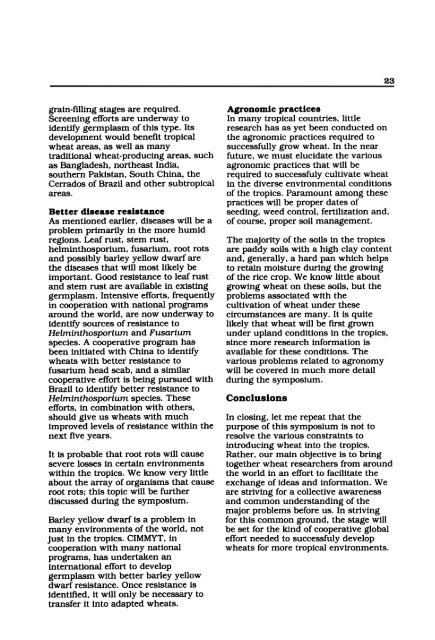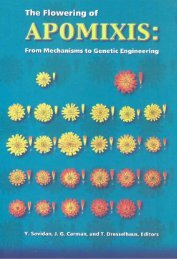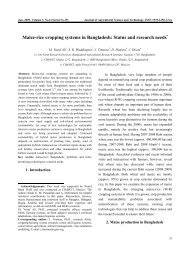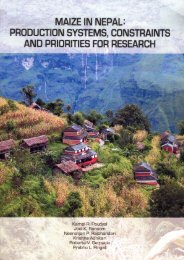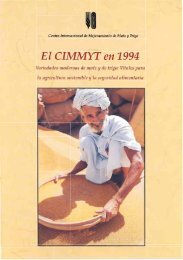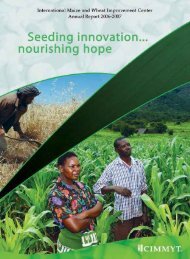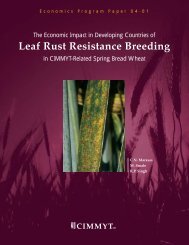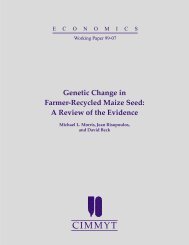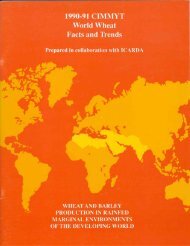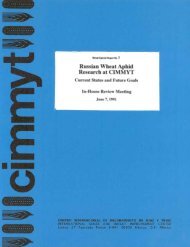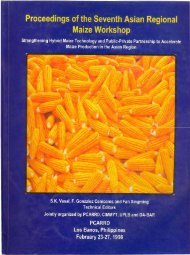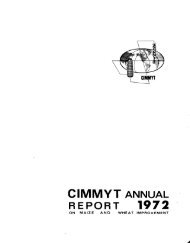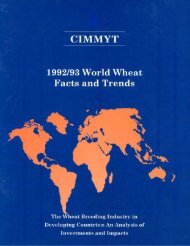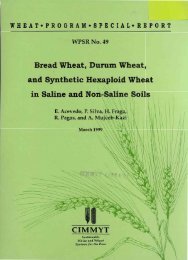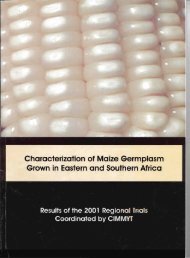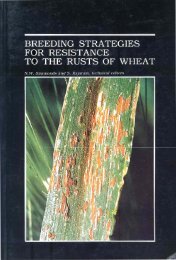the Symposium on Wheats for More Tropical Environments - cimmyt
the Symposium on Wheats for More Tropical Environments - cimmyt
the Symposium on Wheats for More Tropical Environments - cimmyt
- No tags were found...
Create successful ePaper yourself
Turn your PDF publications into a flip-book with our unique Google optimized e-Paper software.
23grain-filling stages are required.Screening ef<strong>for</strong>ts are underway toidentify germplasm of this type. Itsdevelopment would benefit tropicalwheat areas, as well as manytraditi<strong>on</strong>al wheat-producing areas, suchas Bangladesh, nor<str<strong>on</strong>g>the</str<strong>on</strong>g>ast India,sou<str<strong>on</strong>g>the</str<strong>on</strong>g>rn Pakistan, South China. <str<strong>on</strong>g>the</str<strong>on</strong>g>Cerrados of Brazil and o<str<strong>on</strong>g>the</str<strong>on</strong>g>r subtropicalareas.Better ellsease resistanceAs menti<strong>on</strong>ed earlier, diseases will be aproblem primarily in <str<strong>on</strong>g>the</str<strong>on</strong>g> more humidregi<strong>on</strong>s. Leaf rust. stem rust.helminthosporium, fusarium, root rotsand possibly barley yellow dwarf are<str<strong>on</strong>g>the</str<strong>on</strong>g> diseases that will most likely beimportant. Good resistance to leaf rustand stem rust are available in existinggermplasm. Intensive ef<strong>for</strong>ts, frequentlyin cooperati<strong>on</strong> with nati<strong>on</strong>al programsaround <str<strong>on</strong>g>the</str<strong>on</strong>g> world, are now underway toidentify sources of resistance toHelmtnthosportum and Fusariumspecies. A cooperative program hasbeen initiated with China to identifywheats with better resistance tofusarium head scab. and a similarcooperative ef<strong>for</strong>t is being pursued withBrazil to identify better resistance toHelmtnthosporium species. Theseef<strong>for</strong>ts, in combinati<strong>on</strong> with o<str<strong>on</strong>g>the</str<strong>on</strong>g>rs,should give us wheats with muchimproved levels of resistance within <str<strong>on</strong>g>the</str<strong>on</strong>g>next five years.It is probable that root rots will causesevere losses in certain envir<strong>on</strong>mentswithin <str<strong>on</strong>g>the</str<strong>on</strong>g> tropiCS. We know very littleabout <str<strong>on</strong>g>the</str<strong>on</strong>g> array of organisms that causeroot rots; this topic will be fur<str<strong>on</strong>g>the</str<strong>on</strong>g>rdiscussed during <str<strong>on</strong>g>the</str<strong>on</strong>g> symposium.Barley yellow dwarf is a problem inmany envir<strong>on</strong>ments of <str<strong>on</strong>g>the</str<strong>on</strong>g> world, notjust in <str<strong>on</strong>g>the</str<strong>on</strong>g> tropics. CIMMYT, incooperati<strong>on</strong> with many nati<strong>on</strong>alprograms, has undertaken aninternati<strong>on</strong>al ef<strong>for</strong>t to developgermplasm with better barley yellowdwarf resistance. Once resistance isidentified, it will <strong>on</strong>ly be necessary totransfer it into adapted wheats.Agr<strong>on</strong>omic practicesIn many tropical countries. littleresearch has as yet been c<strong>on</strong>ducted <strong>on</strong><str<strong>on</strong>g>the</str<strong>on</strong>g> agr<strong>on</strong>omic practices reqUired tosuccessfully grow wheat. In <str<strong>on</strong>g>the</str<strong>on</strong>g> nearfuture, we must elucidate <str<strong>on</strong>g>the</str<strong>on</strong>g> variousagr<strong>on</strong>omic practices that will berequired to successfuly cultivate wheatin <str<strong>on</strong>g>the</str<strong>on</strong>g> diverse envir<strong>on</strong>mental c<strong>on</strong>diti<strong>on</strong>sof <str<strong>on</strong>g>the</str<strong>on</strong>g> tropics. Paramount am<strong>on</strong>g <str<strong>on</strong>g>the</str<strong>on</strong>g>sepractices will be proper dates ofseeding, weed c<strong>on</strong>trol, fertilizati<strong>on</strong> and.of course, proper soil management.The majority of <str<strong>on</strong>g>the</str<strong>on</strong>g> soils in <str<strong>on</strong>g>the</str<strong>on</strong>g> tropicsare paddy soils with a high clay c<strong>on</strong>tentand, generally. a hard pan which helpsto retain moisture during <str<strong>on</strong>g>the</str<strong>on</strong>g> grOWingof <str<strong>on</strong>g>the</str<strong>on</strong>g> rice crop. We know little aboutgrOWing wheat <strong>on</strong> <str<strong>on</strong>g>the</str<strong>on</strong>g>se soils, but <str<strong>on</strong>g>the</str<strong>on</strong>g>problems associated with <str<strong>on</strong>g>the</str<strong>on</strong>g>cultivati<strong>on</strong> of wheat under <str<strong>on</strong>g>the</str<strong>on</strong>g>secircumstances are many. It is quitelikely that wheat will be first grownunder upland c<strong>on</strong>diti<strong>on</strong>s in <str<strong>on</strong>g>the</str<strong>on</strong>g> tropics.since more research in<strong>for</strong>mati<strong>on</strong> isavailable <strong>for</strong> <str<strong>on</strong>g>the</str<strong>on</strong>g>se c<strong>on</strong>diti<strong>on</strong>s. Thevarious problems related to agr<strong>on</strong>omywill be covered in much more detaildUring <str<strong>on</strong>g>the</str<strong>on</strong>g> symposium.C<strong>on</strong>clusi<strong>on</strong>sIn closing, let me repeat that <str<strong>on</strong>g>the</str<strong>on</strong>g>purpose of this symposium is not toresolve <str<strong>on</strong>g>the</str<strong>on</strong>g> various c<strong>on</strong>straints tointroducing wheat into <str<strong>on</strong>g>the</str<strong>on</strong>g> tropics.Ra<str<strong>on</strong>g>the</str<strong>on</strong>g>r. our main objective is to bringtoge<str<strong>on</strong>g>the</str<strong>on</strong>g>r wheat researchers from around<str<strong>on</strong>g>the</str<strong>on</strong>g> world in an ef<strong>for</strong>t to facilitate <str<strong>on</strong>g>the</str<strong>on</strong>g>exchange of ideas and in<strong>for</strong>mati<strong>on</strong>. Weare striving <strong>for</strong> a collective awarenessand comm<strong>on</strong> understanding of <str<strong>on</strong>g>the</str<strong>on</strong>g>major problems be<strong>for</strong>e us. In striving<strong>for</strong> this comm<strong>on</strong> ground. <str<strong>on</strong>g>the</str<strong>on</strong>g> stage willbe set <strong>for</strong> <str<strong>on</strong>g>the</str<strong>on</strong>g> kind of cooperative globalef<strong>for</strong>t needed to successfuly developwheats <strong>for</strong> more tropical envir<strong>on</strong>ments.


